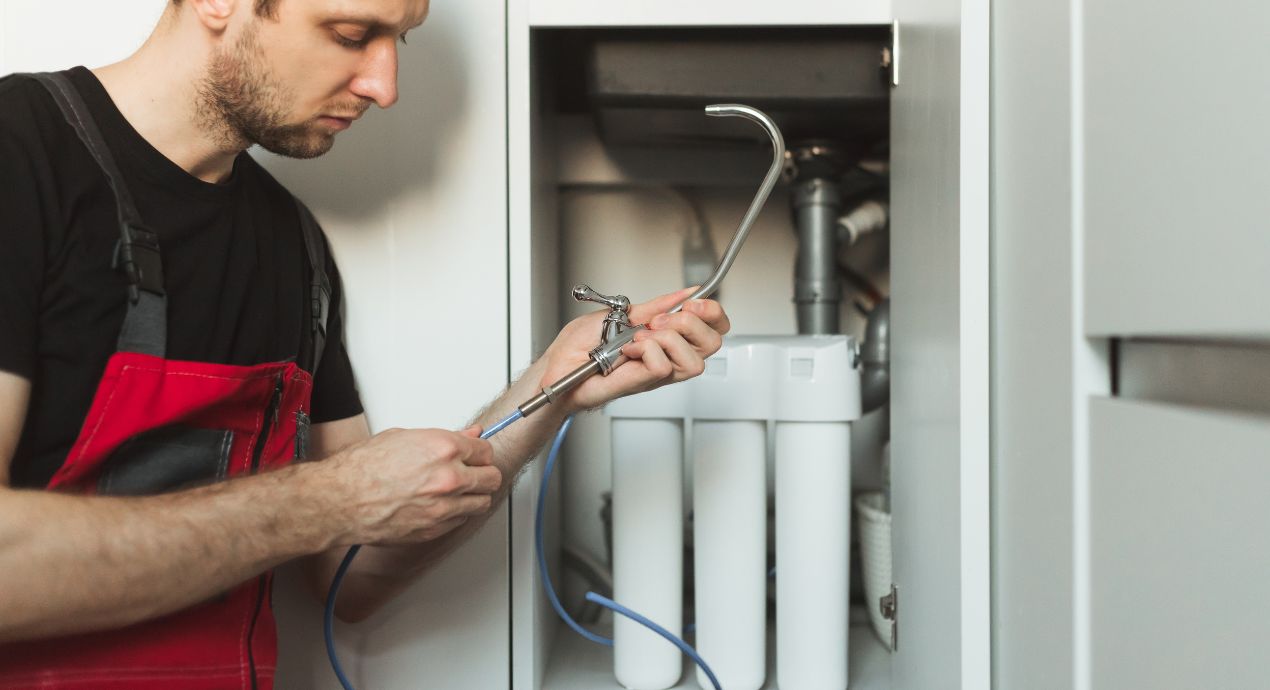
Contemplating coverage?
Subscribe to receive our emails & get
$200 off!
Have questions?
Call us: (833) 544-8273


Written By Rachel Cherem
Water is an essential element of life, but not all water is created equal. Hard water, characterized by high mineral content, can wreak havoc on your plumbing fixtures, appliances, and even your skin and hair. This is where water softeners come into play. They are designed to remove the minerals that cause water hardness, providing you with soft, clean water for all your household needs.
Before diving into the world of water softeners, it's essential to understand what water hardness is and how it affects your daily life. Water hardness is primarily caused by dissolved minerals, such as calcium and magnesium, which are picked up as water flows through soil and rock.
The hardness of water is typically measured in grains per gallon (GPG) or parts per million (PPM). The higher the concentration of minerals, the harder the water. Here's a general guideline for classifying water hardness:
Soft water: 0-1 GPG or 0-17.1 PPM
Slightly hard water: 1-3.5 GPG or 17.1-60 PPM
Moderately hard water: 3.5-7 GPG or 60-120 PPM
Hard water: 7-10.5 GPG or 120-180 PPM
Very hard water: >10.5 GPG or >180 PPM
Hard water can lead to a variety of issues, including:
Scale buildup in pipes and appliances
Reduced efficiency of water heaters and other appliances
Soap scum and film on dishes and fixtures
Dry, itchy skin and dull hair
By installing a water softener, you can mitigate these problems and enjoy the benefits of soft water throughout your home.
Water softeners come in various types, each with its own set of pros & cons. Here are the most common types of water softeners:
Salt-based ion exchange water softeners are the most traditional and widely used type of water softener. They work by replacing calcium and magnesium ions with sodium ions through a process called ion exchange. The harder minerals are trapped in resin beads inside the softener, and sodium ions are released into the water.
Highly effective at removing hardness minerals
Reliable and proven technology
Suitable for households with high levels of water hardness
Requires regular replenishment of salt
Increased sodium levels in softened water may not be suitable for individuals on low-sodium diets
Wastewater produced during regeneration may be a concern for the environment
Salt-free water conditioners, also known as descalers or water conditioners, don't remove minerals from the water but instead change their structure to prevent them from forming scale buildup. They use various technologies such as template-assisted crystallization (TAC) or electromagnetic waves to alter the properties of minerals.
No salt or chemicals required
Low maintenance
Preserves beneficial minerals in the water
Less effective at reducing water hardness compared to salt-based systems
May not work well in areas with extremely hard water
Initial cost may be higher than traditional water softeners
Dual-tank water softeners feature two resin tanks that alternate between softening and regeneration cycles. While one tank is in use, the other undergoes regeneration, ensuring a continuous supply of soft water without interruptions.
Continuous supply of softened water
Regeneration cycle can be customized based on water usage patterns
Suitable for large households with high water demand
Higher upfront cost compared to single-tank systems
Requires adequate space for installation
More complex maintenance and troubleshooting
Magnetic or electronic water softeners claim to soften water by passing it through a magnetic or electronic field. These devices are typically attached to the outside of the water pipe and purportedly alter the structure of minerals to prevent scale buildup.
No salt or chemicals required
Simple installation
Low maintenance
Limited scientific evidence to support effectiveness
May not provide significant reduction in water hardness
Not suitable for highly hard water
Now that you're familiar with the different types of water softeners, let's explore the key factors to consider when selecting the ideal one for your home:
The first step is to determine the hardness level of your water. You can either use a home water testing kit or have your water tested by a professional. Knowing the hardness level will help you choose a water softener that can effectively treat your water.
Consider your household's water usage patterns, including the number of occupants, daily water consumption, and peak usage times. This information will help you determine the appropriate size and capacity of the water softener to ensure an adequate supply of softened water.
Evaluate the space available for installing the water softener. Consider factors such as the size of the unit, clearance requirements for maintenance, and proximity to plumbing connections. Choose a water softener that fits comfortably within your available space.
Salt-based water softeners require periodic regeneration to recharge the resin beads. Consider the regeneration frequency and adjust it based on your water usage patterns to minimize salt and water consumption.
Calculate the long-term operating costs associated with each type of water softener, including salt or maintenance expenses. While salt-free systems may have lower ongoing costs, they may not be as effective in treating hard water.
Consider the maintenance requirements of the water softener, including salt replenishment, resin replacement, and cleaning. Choose a system that aligns with your maintenance preferences and schedule.
If you have specific water quality concerns beyond hardness, such as iron or manganese contamination, consider whether the water softener can address these issues or if additional treatment methods are necessary.
Look for water softeners that come with a comprehensive warranty and reliable customer support. This ensures peace of mind and assistance in case of any issues or malfunctions.
Choosing the right water softener for your home is a decision that requires careful consideration of various factors. Invest in the right water softener today and enjoy the benefits of soft water throughout your home.
Stay Ahead of Potential
Home Mishaps!
Subscribe to our Liberty Home Guard Newsletter and gain access to exclusive content that ensures your peace of mind.